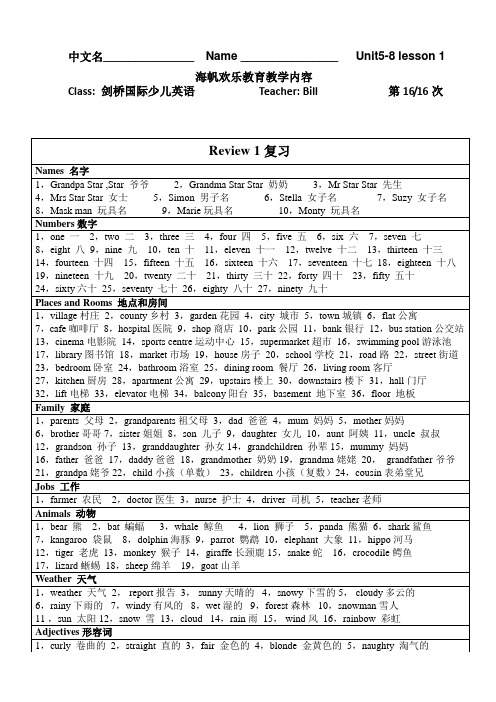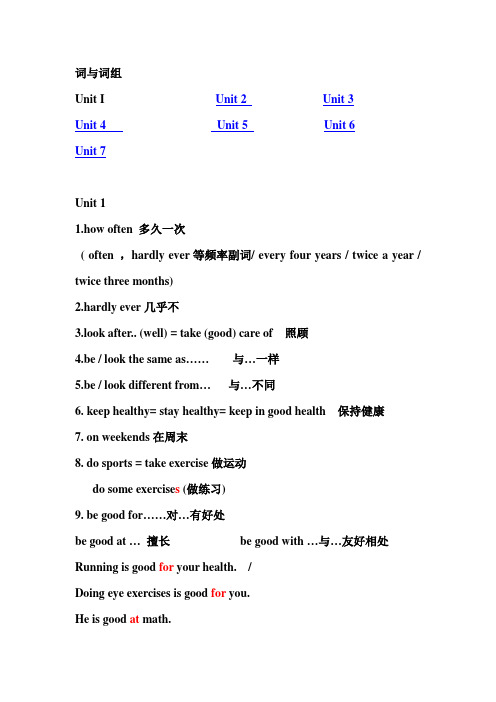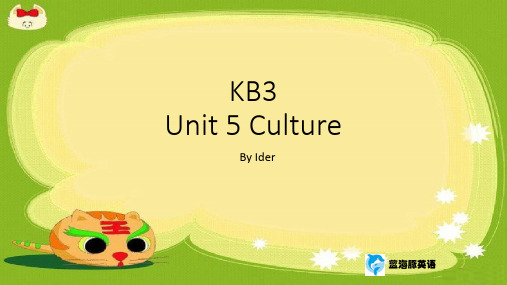剑桥英语U3_5的复习提纲
Unit5 复习提纲

2013-2014学年第一学期八年级英语Unit 5知识归纳重点短语、词组和句型Class________ Grade________ Name______________ Number_________I. 单词短语电视节目the TV shows1.谈话节目7.每天every day2.通常usually 8.每天一次once a day3.时常often 9.每周两次twice a week4.有时sometimes 10.每月三次three times a month5.几乎不hardly ever 11.每年四次four times a year6.从不never 12.每周一至三次one to three times a week 活动activities1.帮忙做家务help with housework 7.看英语书read English books2.去看电影go to the movies 8.上舞蹈课have dance lessons3.上网use the Internet/go online 9.做运动play/do sports4.购物go shopping 10.去野营go camping5.洗餐具wash/do the dishes 11.去看牙齿go to the dentist6.熬夜stay up late 12.喝咖啡drink coffee其他重点词组与单词1.在周末on weekends2.对……有好处/坏处be good/bad for3.至少at least4.例如such as5.垃圾食品junk food6.一点儿也不……not…at all7.想要某人做某事want sb. to do sth. 8.在某人的业余时间in one’s free time 9.多于more than 10.少于less than11.做某事的最好方式the best way to do sth. 12.通过做某事by doing sth.小试身手:用下列词组或单词造句1.be good/bad for _______________________________________________________________2.at least _____________________________________________________________________3.such as _____________________________________________________________________4.not … at all ___________________________________________________________________5.want sb. to do sth. ____________________________________________________________6.in one’s free time ______________________________________________________________7.more than __________________________________________________________________8.less than __________________________________________________________________9.the best way to do sth. __________________________________________________________10.by doing sth. ________________________________________________________________ II. 重点句型1.你周末通常都做什么?What do you usually do on weekends?我总是锻炼身体。
16--海帆剑桥国际少儿英语KB3-Unit-5-8-阶段复习

Adverbs副词:1,always总是2,sometimes有时候3,never从不4,every day每天
Verbs动词:1,move搬家2,live居住3,help帮助4,need需要
5,carry拿6,smile微笑7,swim游泳
It`s got abalcony.它有一个阳台。
It hasn`tgot abasement.它没有地下室。
12,What`s your address ?你的地址是什么?It`s 72 Station Road.车站路72号。
13,May lives at number ninety-eight.May住在98号楼。
17,library图书馆18,market市场19,house房子20,school学校21,road路22,street街道
23,bedroom卧室24,bathroom浴室25,dining room餐厅26,living room客厅
27,kitchen厨房28,apartment公寓29,upstairs楼上30,downstairs楼下31,hall门厅
17,What does he do every day?他每天都干什么?Hewashes handsevery day.他每天都洗手。
18,What time do youget up?你几点起床?Iget upat7 o'clock.我七点起床。
19,When does shego to bedevery day?她每天几点睡觉?
14,What number is your room?你的房间号码是多少?It`s 302.
Units1-7提纲

词与词组Unit I Unit 2 Unit 3Unit 4 Unit 5 Unit 6Unit 7Unit 11.how often 多久一次( often ,hardly ever等频率副词/ every four years / twice a year / twice three months)2.hardly ever几乎不3.look after.. (well) = take (good) care of 照顾4.be / look the same as……与…一样5.be / look different from…与…不同6. keep healthy= stay healthy= keep in good health 保持健康7. on weekends在周末8. do sports = take exercise做运动do some exercise s (做练习)9. be good for……对…有好处be good at …擅长be good with …与…友好相处Running is good for your health. /Doing eye exercises is good for you.He is good at math.I am better at math than he is.Y ou should be good with the children.补习班1.go to the movies2.watch TV / do homework / get up3.once/twice a week once or twice 一两次two or three times 两三次4.surf the Internet5.read English books6.every day 每一天(两个词)7.Here is + 单数Here are + 复数这儿有…8.as for 至于9.Who’s the best English student?10.junk food11.want sb. to do sth. help sb. (to) do sth.e home from school 放学回家13.eating habits14.of course15.healthy lifestyle16.get good grades17.kind of18.take notes19.keep in good healthUnit 21.have a (bad) cold 感冒2. have a stomachache 胃痛3. have a sore throat 喉咙痛4. have a headache 头痛have a lot of headaches 经常头痛5. have a toothache 牙痛6. have a rest=take a rest=take a break=relax 休息7. see a dentist看牙医see a doctor 看医生go to the doctorgo to the doctor’s8. be stressed out 紧张9. What’s the matter with….?…=What’s wrong with…?=What’s the trouble with…?=What’s the problem with…? 怎么了?10. need a balance of yin and yang需要阴阳平衡a balanced diet平衡的饮食11. for example = such as 例如12. It’s easy / important / necessary(for sb.) to do sth…做某事很简单/重要/有必要13. feel well 感到身体好I don’t feel well. = I feel terrible / bad.14. lie down躺下来15. hot tea with honey 有蜂蜜的热茶16. have a (high) fever发烧17. at the moment= now = right now现在18. I’m sorry to hear that.听到这个很难过。
剑桥国际少儿英语3KB3 unit 5 culture讲课讲稿

I like running and dancing.
蓝海豚英语
Make a “keep healthy” book.
蓝海豚英语
蓝海豚英语
蓝海豚英语
3
Our bodies need rest too. Everybody needs to sleep and children need to sleep about 10 hours every night.
Animals: Cats need 16 hours to sleep. Giraffes only need 30 minutes. Koala sleeps 22 hours every day.
smokin g蓝海豚英语
What will happen?
蓝海豚英语
What else?We can...
exercise
蓝海豚英语
2
Exercise is good for our bodies. We can ride bikes, walk, run and swim or we can play sports like football, basketball and tennis. It's important to move our bodies to be healthy.
KB3 Unit 5 Culture
By Ider
蓝海豚英语
What are they doing?
They are ...
singing
playing football
playing basketball
蓝海豚英语
What are they doing?
They are ...
剑桥国际英语教程大纲

WRITTING
15
A RECIPE
作业
READING
20
FOOD AND MOOD
TOTAL
120
Unit3-4progress check
name
Time(MIN)
contents
Remarks
homework
SPEAKING
5
COMPOUND NOUNS
18
LISTENNING
----
SINGAPORE SOVLES IT
DISCUSSION
22
YOU BE THE JUDGE
WRITING
5
A LETTER TO THE EDITOR
作业
SNAPSHOT
5
DAILY WORDS
10SENTENCES
CONVERSATION
5
COULD YOU TELL ME…..
GRAMMAR FOCUS
Remarks
homework
LISTENNING
5
COMPOUND NOUNS
DISCUSSION
15
TRANSPORTATION SERVICES
ROLE PLAY
10
ADVERBS OF QUANTITY
SPEAKING
10
SINGAPORE SOVLES IT
TOTAL
40
SINGAPORE SOVLES IT
TOTAL
120
Unit6 OK.NO PROBLEM!
name
Time(MIN)
contents
Remarks
homework
剑桥二级资料U3U5笔记

U3 L et’s play doctors.What’s the matter with you? 你怎么了?I’ve got a cold.我感冒了。
an ear ache/ a headache / a stomach ache /耳痛头痛肚子痛a toothache / a c ough / a temper a ture牙痛咳嗽发烧What’s wrong with you?= What’s the matter with you? 你怎么了?U5 Simon Paul lives in the country.Where do you like living? I like living in the c i t y. 你喜欢住在哪里?我喜欢住在城市。
in the country / on the island / in the mountain / 在乡下在岛上在山上in the forest / near the lake / by a river /在森林在湖边在河边next to a supermarket在超市附近What can you do in the city?城市What can you do in the country?乡村I can visit a zoo.go to the park / see a movie / play sport games / 去公园看电影做运动go to the library 去图书馆sleep in the grass / listen to birds singing /在草地上睡觉听小鸟唱歌have a picnic / go fishing /去野餐去钓鱼。
剑桥国际少儿英语3第五单元lock and key
剑桥国际少儿英语3第五单元lock and keyThe intricate dance between locks and keys has been a captivating part of human history for centuries. These seemingly simple mechanisms have played a vital role in securing our most prized possessions, safeguarding our privacy, and shaping the way we interact with the world around us. In this essay, we will delve into the fascinating world of locks and keys, exploring their evolution, their significance, and the myriad ways in which they have become woven into the fabric of our lives.Locks and keys have a long and storied history, dating back to ancient civilizations. The earliest known lock and key system was discovered in the ruins of the ancient Egyptian city of Nineveh, dating back to around 4000 BC. These primitive devices were made of wood and consisted of a bolt that could be secured by a wooden pin tumbler lock. As civilizations advanced, so too did the complexity and sophistication of lock and key systems.Throughout the ages, locks have been crafted from a variety of materials, each with its own unique properties and applications. Fromthe sturdy iron locks of medieval castles to the delicate pin tumbler locks of modern-day homes, the evolution of these devices has been a testament to human ingenuity and the constant drive to create more secure and reliable means of protection.One of the most significant advancements in lock technology came with the invention of the pin tumbler lock, attributed to the ancient Egyptians. This design, which utilizes a series of pins of varying lengths to prevent the bolt from opening without the correct key, has remained a fundamental component of many modern lock systems. As technology has progressed, lock designs have become increasingly complex, incorporating features such as electronic sensors, biometric identification, and even wireless connectivity.Alongside the development of locks, the creation of keys has also been a crucial aspect of this enduring story. Keys, too, have evolved from their humble beginnings as simple wooden or metal devices to the sophisticated, high-tech tools we use today. From the intricate warding and bitting patterns of traditional keys to the advanced radio-frequency identification (RFID) chips found in modern keyless entry systems, the key has become a symbol of access, control, and trust.The significance of locks and keys extends far beyond their practical applications. These humble devices have become cultural icons,representing themes of security, privacy, and personal identity. In literature and art, locks and keys have been used as metaphors for the human condition, exploring themes of trust, vulnerability, and the search for personal fulfillment.One particularly poignant example can be found in the works of renowned author Ernest Hemingway. In his novel "The Sun Also Rises," Hemingway uses the imagery of a locked suitcase to symbolize the emotional barriers and personal struggles faced by the characters. The suitcase, with its key held by a distant lover, becomes a tangible representation of the characters' inability to fully connect with one another, highlighting the universal human desire for intimacy and understanding.Similarly, in the realm of art, locks and keys have been the subject of countless works, from the intricate etchings of Albrecht Dürer to the surreal sculptures of Salvador Dalí. These artistic interpretations have further cemented the symbolic significance of these everyday objects, inviting viewers to explore the deeper meanings and emotional resonances that they evoke.Beyond their cultural significance, locks and keys have also played a crucial role in the practical aspects of our lives. From the simple padlocks securing our bicycles to the high-security systems safeguarding our most valuable assets, these devices have becomean integral part of our daily routines and the infrastructure that supports our modern world.In the realm of security, the importance of locks and keys cannot be overstated. They have become essential tools in protecting our homes, businesses, and vital information from the prying eyes of those who seek to do us harm. The continuous advancements in lock technology have led to the creation of increasingly sophisticated systems that utilize biometric data, encrypted codes, and even cloud-based access management to ensure the safety and privacy of our most sensitive belongings.Furthermore, the use of locks and keys extends beyond the realm of personal and commercial security. In the world of transportation, these devices have become vital components in securing everything from vehicles to shipping containers, ensuring the safe and efficient movement of people and goods around the globe. The development of advanced key technologies, such as keyless entry systems and remote-controlled locks, has revolutionized the way we interact with our modes of transportation, providing greater convenience and security.Looking to the future, the role of locks and keys is poised to evolve even further. As the world becomes increasingly connected through the Internet of Things (IoT), the integration of smart locks and digitalkeys is expected to transform the way we access and secure our homes, workplaces, and even entire cities. Imagine a world where a single digital key, stored securely on your smartphone, could grant you access to your front door, your office, and your car, all with a simple tap or voice command.This vision of a seamlessly connected future is not merely a fanciful dream, but rather a tangible reality that is rapidly taking shape. As technology continues to advance, the humble lock and key are set to play an even more vital role in shaping the way we live, work, and interact with the world around us.In conclusion, the story of locks and keys is a testament to the enduring ingenuity and adaptability of the human spirit. From their ancient origins to their modern-day applications, these unassuming devices have become a fundamental part of our lives, safeguarding our most prized possessions, securing our personal and collective safety, and serving as powerful symbols of trust, privacy, and personal identity. As we look to the future, the continued evolution of locks and keys will undoubtedly continue to shape the way we navigate the world, opening doors to new possibilities and forging ever-stronger connections between ourselves and the spaces we inhabit.。
国际剑桥少儿英语5 KB5A Unit3city life (1)
Words: straight on 一直向前 corner 拐弯处,角落
along 沿着 opposite 在..... 对面
across穿过
street 街道 airport 机场 cave 洞穴 of course当然
Sentences: Go along The High Street and turn right into Blue Street.Turn left into Low
Go across the river.Go straight on.Take the second street on the right,and go straight on.Take the second street on the left.
18796054321
castle
cinema library
5. Go up The High Street.Take the first street on the right.Next,take the first street on the left and go across Green Street.Then take the first street on the right.What's on the left?
A cave. Secret writing Brutus Grabbe
Homework: 1.抄写以下单词各3次并背诵。 2.抄写以下句子各1次并背诵。
2018.5.19
3. 按照课本第27页第7部分的要求,写出从fire station 到
school 的路线。
4.发微信作业给老师。 (单词,句子,以及路线。)
school
swimming pool fire station
剑桥版英语五年级上册 Unit 3 第三课时(Part 5)教学课件
Changjiang River
Yellow Crane Tower
Wuhan University
Let’s read more about Betty.
Part 2
I get up at seven o’clock. I go to school at twenty to eight. School starts at quarter past eight. School ends at half past four. I go to bed at nine.
Hi Betty, I’m John Rosen. I am twelve years old and I live in Sydney, Australia. I like collecting stamps. I like computers and swimming. I get up at seven. I go to school at quarter to eight. School starts at nine. It ends at three. Then I go swimming or watch TV. I go to bed at nine. Yours, John
Fill in the table. What time does Betty ...?
Betty
get up
7:00
go to school
7:40
school starts
8:15
school ends
4:30
go to bed
9:00
Listen and read
Dear John, I’m Betty Lin. I’m eleven years old and I live in Wuhan, China. I like playing the piano. I like reading books. I get up at seven o’clock. I go to school at twenty to eight. S chool starts at quarter past eight. School ends at half past f our. I go to bed at nine. Please write to me and tell me about your day. Yours, Betty
教学课件:U3-5复习
A. interesting B. interested C. morபைடு நூலகம் interesting D. most interesting 5.China is larger than _________ in Asia.
loud/loudly cheap/cheaply beautiful/beautifully (1)The boy studies very__________(认真) (2)He finished the work__________(成功) (3)The boy speaks________than the girl.(大声) (4)The girl with long hair sings_________of the three.(动听)
6.--你认为……怎么样?--
7.watch/see/hear sb/sth ________ I saw the boys________(fight) 2 minutes ago. We often see some children________(play)football on the playground.
A. any other country B. other countries C. the other country D. any country 6.The boy sings as______as his sister. A.loud B.loudly C.louder D.loudest
